Lowell Week in Review: July 30, 2017
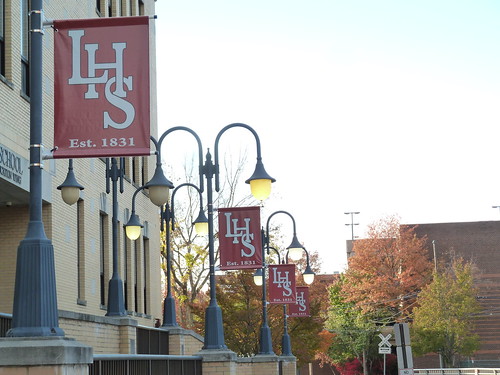
New Lowell High: Buyer’s Remorse?
One of the many things that has amazed me about the new Lowell High issue has been the abscense of an in-depth discussion of whether tax payers will be willing to pay for it. City officials have often said we have the “excess levy capacity” to absorb the annual bond payments for a new high school without having to resort to a Proposition 2.5 debt exclusion referendum, but that just addresses the city’s ABILITY to pay for it, not the WILLINGNESS of property owners to pay for it.
The way I understand it, Proposition 2.5 does two things: It places a ceiling on the total amount of property tax revenue that a municipality may raise each year, with that ceiling being 2.5% of the assessed value of all taxable property in the city. Second, the law limits the annual increase in property taxes to not more than 2.5% of the amount raised in property taxes the prior year (plus any taxes attributable to “new growth”).
Historically, Lowell has been averse to raising taxes. There are a number of reasons for that. Many of the city’s property tax paying residents are older and on fixed incomes. They vote in city council elections in larger percentages than do other groups. People in this category worry in general about their ability to pay all of their bills with real estate taxes being one of the biggest. Then our commercial property gets taxed at a much higher rate than residential properties. While there are far fewer commercial property owners than residential owners, the commercial owners tend to have an outsized voice in public affairs. They may not even live in Lowell, but they own commercial property here, and they spend time in the same social and political circles as do elected officials, and they’re not shy about voicing their displeasure over what they see as high taxes on commercial properties. Then there are the mainstream media outlets in the city which are conservative and anti-tax in their outlook. One reason for that is that many of the 10,000 or so people who regularly vote in city elections are also conservative and anti-tax in their political philosophy, notwithstanding their party registration.
The city has excess levy capacity today because the voters of Lowell have never wanted their taxes to go up, even just a little, even when not raising taxes has led to long-term harm and future fiscal disarray. But in the context of the new high school process, this excess levy capacity has been framed as an almost conscious effort by city governments through the years to accumulate this big levy cushion so that it could all be devoted to one enormously expensive capital project – the new high school. But that misrepresents how the excess levy capacity came to be.
Only a year ago, when asked, “Do you think there will be a new high school?” my answer was no, because there was no strong constituency for one, and because the majority of those who vote in city elections wouldn’t be willing to pay for it. Then suddenly, there emerged not one constituency for a new high school but two. One supported renovating the existing downtown site, the other building an entirely new school at Cawley Stadium. The speed with which these groups emerged and the intensity they devoted to the issue were startling. The debate became completely binary: you were either for downtown, or for Cawley. There was no other option. And everyone, councilors included, got caught in the downtown versus Cawley fight. The “you’re either with us or you’re against us” aspect of the debate boxed out any serious discussion about the impact the long-term cost of the project would have on tax payers, many of whom were on the sidelines of this contest.
Which brings us to last Tuesday’s city council meeting and the motion by Councilors Elliott and Mercier requesting that “the City Manager meet with the Finance Subcommittee to create financing plan to minimize impact of debt service of high school to senior citizens and those on fixed income.” The motion passed on a voice vote, but not before some of heated exchanges including charges of “pandering to voters.”
Here are the notes I took on the discussion of this motion on Tuesday night:
Elliott/C. Mercier – Req. City Mgr. meet with Finance SC to create financing plan to minimize impact of debt service of high school to senior citizens and those on fixed income. Council Mercier says there are different ways to structure how a city pays off a bond. She wants to know the best, most advantageous way to pay the debt for the high school when it comes to lessening the impact on the finances of senior citizens and others on fixed income. She says she is nervous for seniors and people on fixed income.
Councilor Elliott says that is the crux of the issue. Says at previous finances subcommittee meetings, he has raised this issue. He says now that the plan for the high school has been selected, we have to look at the impact on people who are on fixed income and seniors. So maybe we should lessen the amount of the overall debt that has to be paid back so that the burden is heavier later so that people who make use of the high school will be the ones paying for the bulk of it. He wants to remove the anxiety that people may have that they might lose their homes because of higher taxes due to the high school. Says the next generation should be able to pay more of the burden.
Councilor Belanger thinks this is a great motion. He’s in favor of anything that reduces the tax burden on the elderly. Asks Conor Baldwin if city can use creative financing to pay for the high school, say with debt exclusion, so that there are lower payments in the beginning and higher payments in the end. Baldwin says the finance team will look into a number of options like short term financing at the beginning to meet cash flow needs. That would push back the biggest payments until later.
Councilor Milinazzo says he’ll support the motion in the hope something good comes out of it, but he says he views this as pandering of votes by the makers of the motion. He can’t believe the gall or the audacity of the makers of the motion. He says he hopes that Councilor Mercier who is in this protected class exempts herself from this. He says he’s insulted by this because it is only pandering for votes.
Councilor Mercier defends herself, challenges Milinazzo to run for reelection and not hide from the voters by not running.
Councilor Leahy says he’ll support the motion because of all the debt that the city has to take on for the new high school, repairs to the existing high school, and the police station. And it’s not just the elderly, it effects everyone, people putting kids through college, first time home owners, everyone.
Councilor Elliott says it is incumbent on us to raise the bar and not make it personal. Addressing Milinazzo, he says I understand you’re on the losing end of this, but you shouldn’t belittle this motion. Councilor Mercier and I are at the Senior Center all the time and that’s what people there are concerned about. Says we are all looking for votes. That’s what we do. But the personal attacks have to stop.
The “concerns of the people at the Senior Center” about their ability to pay the tax increase associated with this project won’t be limited to the people at the Senior Center. As councilors and candidates campaign around the city in the coming months, that concern is what they will repeatedly hear from the many voters who are not part of the downtown or Cawley advocacy groups.
An interesting question will be whether responsibility for this looming tax increase will be laid at the feet of the five councilors who were on the winning side of the high school location vote – Councilors Elliott, Mercier, Belanger, Rourke and Leary all voted for Cawley and all are running for reelection – or whether voters will deem all incumbents equally culpable since even those on the “losing” side – Mayor Kennedy and Councilors Samaras, Leahy and Milinazzo (who is not running for reelection) – were all willing to encumber the city with this large tax increase, just for another site.
But just as tax payers who weren’t closely affiliated with one advocacy group or the other largely stayed silent during the high school siting debate, so might they remain apart from any emerging debate over the impact of big increases in property tax bills to come until those bills actually arrive. And those bills won’t arrive until after this fall’s election.
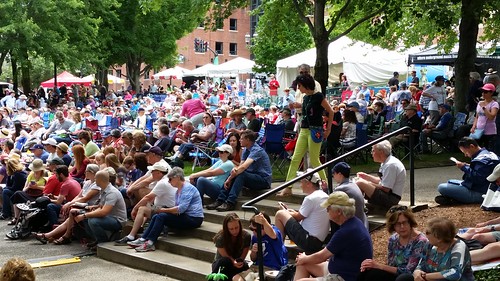
Boarding House Park
Lowell Folk Festival
Downtown was packed yesterday with a big and diverse crowd enjoying the 2017 Lowell Folk Festival. For many who have lived in Lowell for a long time, it’s gratifying to see so many people enjoying the downtown. As a long time Folk Festival attendee, it’s also interesting to see how the event evolves over time. For instance, the earliest Folk Festivals had the evening performances on the South Common. There was no Dutton Street dance tent, and the acoustic stage was in the Market Mills courtyard rather than at St. Anne’s Church.
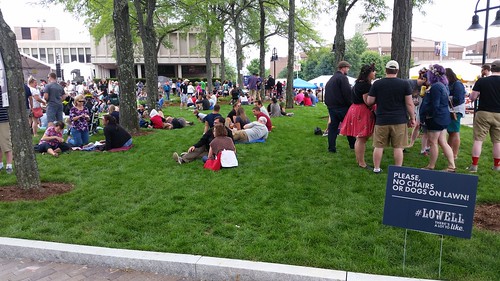
New greenspace on JFK Plaza
This year’s biggest change seemed to be in the JFK Plaza area. With the city having done a great job in getting grass and flower beds planted along the edge of the plaza in time for the festival, people were enjoying the shady greenspace as a place to eat, relax, and listen to the music. But the new greenspace caused the displacement of several of the ethnic food booths that used to occupy the perimeter of the plaza. This year, they are along Arcand Drive in front of the police station.
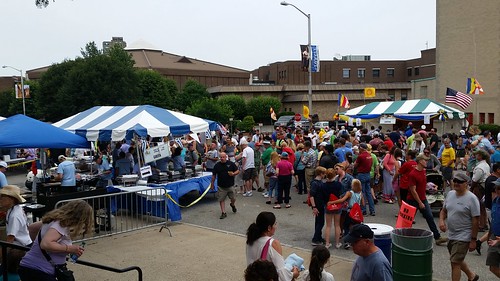
Ethnic food booths on JFK Plaza
Yesterday afternoon, the food booths all had long lines, so their new location didn’t seem to have hurt their business, and JFK Plaza seemed roomier and more inviting with more open space to gather, socialize, and listen to the music. From what I saw, that move has been a success.
Then Merrimack Street was transformed into “Destination Lowell” with two rows of tents which hosted a number of vendors from Mill No. 5 and other outside-the-Festival-perimeter businesses. Local cultural organizations like the MRT, the Lowell Historical Society and Lowell Parks and Conservation Trust, all had tables.
With the weather calling for fair weather all day today, we should be spared the traditional thunder storm that has so often disrupted one afternoon of the festival. If you have yet to pay this year’s festival a visit, get to downtown Lowell this afternoon and check out the 2017 Lowell Folk Festival.

Northern Canal
Lowell Walks Resumes on Saturday
This coming Saturday, August 5, 2017, Lowell Walks will resume with “Northern Canal Urban Renewal Project” led by Chris Hayes and Aurora Erickson. The walk begins at 10 am at Lowell National Park Visitor Center, 246 Market Street. It’s free, and will last about 90 minutes.
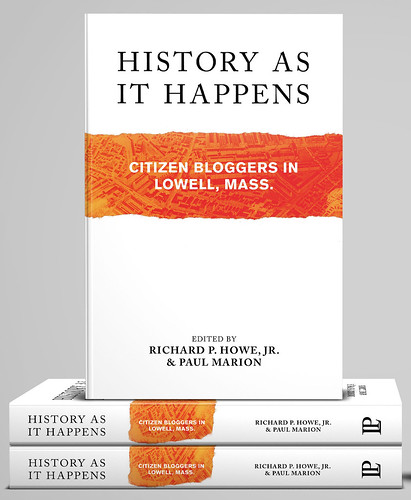
Immediately following the walk, there will be a book launch event for History as It Happens: Citizen Bloggers in Lowell, Massachusetts. The book launch event will be at Lowell Telecommunications Corporation, also at 246 Market Street, and will run from 11:30 am until 1:30 pm. There is no speaking program; it’s more of a drop-in and mingle event, so come anytime during that two hour window.
History as It Happens, edited by Paul Marion and me, captures the best writing and images from this blog from 2007 through 2016. Arranged chronologically, the book recalls big events in Lowell politics, history, culture, breaking news, and much more, with contributions from 40 different authors. Normally selling for $20, the book will be available for just $10 during the book launch event.
Boston Globe article, 7/30, about financial pressure on elders
https://www.bostonglobe.com/business/2017/07/29/for-elderly-economic-security-elusive/b33cs3PSreXb6IJ9XMpnUM/story.html